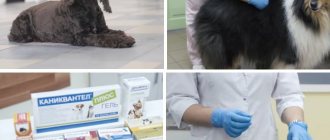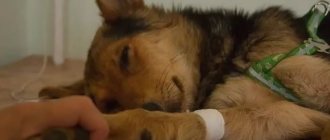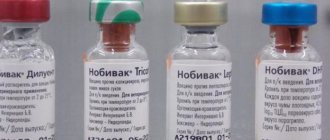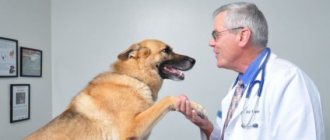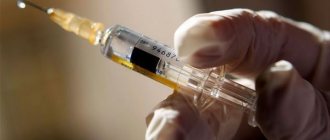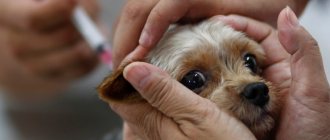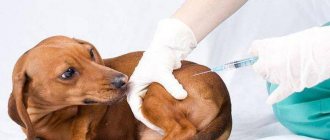We invite you to get your dogs vaccinated at our center!
You can vaccinate dogs in Rostov-on-Don in many clinics. We offer comprehensive services with preliminary preparation for vaccination, further monitoring and revaccination in the future. Our dog vaccines are complex, providing protection against several viruses at once, only from the best imported manufacturers.
As noted above, it does not depend on the breed of the pet how and when to vaccinate. It is important to take into account age; there is a certain vaccination schedule for pets:
· Puppies begin to be vaccinated at 8 weeks of age.
Revaccination is carried out after 3 weeks
· Persistent immunity is formed 2 weeks after the second vaccination. During these days, you should watch your baby especially carefully, do not overcool, and do not wash him.
· The third vaccination is given to puppies after the permanent canines have grown.
· One more vaccination is given every year.
· Then the dog is given revaccination every year for the rest of its life.
If your pet came to you with the first vaccination, then he has a document certifying this. If there is none, then when you first contact us, the animal receives a special passport, where all data on vaccinations throughout its life are entered. This is necessary for travel lovers and regular exhibition tours. And in general, it’s a useful thing. So you can definitely say that, for example, the dog was vaccinated against rabies in a timely manner.
Vaccination
Vaccinating your pet is your way to show care and love for your four-legged friend. In addition, for those traveling with four-legged friends, it is mandatory to have a document confirming vaccination in accordance with the accepted vaccination protocol. At the same time, there are a number of mandatory vaccinations and those that are advisory. Below you can find the following information:
- how much do vaccinations cost for dogs, cats, rabbits
- content of vaccination services in the network of veterinary clinics “Animal Health”
- Vaccinations for dogs and cats
- what are vaccinations for?
- vaccination rules
- possible complications
Vaccination of four-legged animals in veterinary clinics Animal Health – Prices
| Vakderm | 480 rub. |
| Associated vaccine for rabbits (Myxomatosis + VGBV) | 420 rub. |
| Vanguard 5 | 835 rub. |
| Vanguard 5 plus | 850 rub. |
| Vanguard 5 plus with coronavirus | 890 rub. |
| Vanguard 7 | 900 rub. |
| Hexakanivac | 590 rub. |
| Multifel 4 | 545 rub. |
| Nobivak DHPPI + Lepto + Rabies | RUB 1,155 |
| Nobivac DHPPI + Lepto4 | 900 rub. |
| Nobivak DHPPI + Lepto4 + Rabies | RUB 1,265 |
| Nobivac DHPPI+Lepto | 790 rub. |
| Nobivac DHPPI+LR | RUB 1,155 |
| Nobivac LR | 410 rub. |
| Nobivac PUPPY | 760 rub. |
| Nobivak KS | 735 rub. |
| Nobivac Rabies | 460 rub. |
| Nobivak Trikat | 765 rub. |
| Polivak for cats | 535 rub. |
| Polivac for dogs | 535 rub. |
| Purevax | 1,000 rub. |
| Purevax + Chlamydia | RUB 1,080 |
| Purevax Leukosis | RUB 1,670 |
| Rabizin | 450 rub. |
| Eurikan | 880 rub. |
| Eurikan DHPPI+LR | 1,200 rub. |
| Eurikan DHPPI | 1,050 rub. |
What is included in the cost of vaccination of cats and dogs?
- animal examination, thermometry
- cost of intramuscular or subcutaneous injection,
- mark in the passport (registration of a veterinary passport if necessary).
What vaccinations are given to dogs and cats?
The most popular vaccinations against rabies, distemper, parvavirus, parainfluenza, adenovirus and other dangerous diseases are an integral part of caring for your pet. Regular vaccination is the key to the health and good mood of your four-legged friend. Along with the mandatory vaccinations given to puppies and kittens, these manipulations are rather advisory in nature. However, they are the ones who are able to provide maximum protection. Indeed, often the source of infection can be elementary carelessness during a walk. And the consequences and complications of these diseases are very deplorable.
Why do dogs or cats need vaccinations?
Along with the obvious answer to this question (this is the modern protection of our pets from dangerous and deadly diseases), there are some situations that confuse the owners of furry (or not so furry) friends. The key item in this case is the presence of a passport confirming the vaccinations performed. It will allow you to painlessly carry out the following actions:
- cross state borders - be sure to check the list of mandatory vaccinations for crossing the border of a particular state; Vaccination must be carried out at least 30 days before travel.
- take part in exhibitions - pets without a passport or without all the required vaccinations are not allowed to participate.
- transferring a pet for temporary care from a hotel or foundation - the vast majority of such organizations require compliance with the vaccination protocol for adoption “for boarding”.
- ensuring the protection of your pet in the event of harm to third parties - this is especially important if you are the owner of a young and active dog, however, in world practice, cases are also common when a person is bitten not by dogs, but by cats. Providing a passport confirming mandatory regular vaccination will help eliminate doubts and risks for the injured party, and also mitigate liability for the owner.
Basic rules for successful and safe vaccination
Getting your cat, dog, rabbit or other pets vaccinated is just as important as getting your own personal vaccinations. In addition, cats and dogs without vaccination(s) are not allowed to cross the border or participate in exhibitions. To make this procedure as simple, timely and effective as possible, the following rules must be followed:
- 10-14 days before vaccination, it is necessary to give the animal an anthelmintic and get rid of other parasites (ticks, fleas).
- Only clinically healthy animals are vaccinated. If you have any doubts about your pet's condition, make an appointment with your veterinarian to rule out possible complications.
- Compliance with the vaccination schedule. Many vaccines are administered several times to achieve the final effect. Vaccination intervals are written down in the passport so that the owner can navigate the timing. Our administrators will definitely remind you of the need for re-vaccination by phone. This will allow you not to miss the optimal timing of revaccination, compliance with which is mandatory for subsequent border crossings or participation in exhibitions. Network of veterinary clinics, pet stores and veterinary pharmacies 'Animal Health'
- Vaccination is performed no later than 3 weeks before the planned surgery and no earlier than 3 weeks after it. This ensures maximum safety for the pet and the effectiveness of both vaccination and surgery.
- Vaccinations must be done in veterinary clinics that have the appropriate permits. This is a kind of guarantee against unfair storage and handling of the administered vaccine, and, accordingly, a guarantee of the pet’s safety.
- After vaccination, it is necessary to provide the pet with comfortable conditions, to exclude drafts and hypothermia.
- If after vaccination your pet exhibits atypical behavior and refuses water, it is better to immediately consult a doctor. A slight decrease in activity in the first days after vaccination is acceptable.
Possible complications after vaccination of animals. What to do?
Even if you follow all the above rules, emergency situations may arise: allergic reactions, redness on the skin, etc. They happen quite rarely - less than 1% of cases. However, it will not be superfluous to familiarize yourself and take note.
Allergic reactions
Such a reaction may be severe due to sensitivity to the components of a particular vaccine. Symptoms of an allergic nature include: increased salivation, difficulty breathing, involuntary bowel movements, inappropriate behavioral reactions and others. Such reactions may appear within a few minutes after the injection. Observe your pet's condition for half an hour after vaccination - do not leave the veterinary clinic as soon as possible. If an allergy occurs, your veterinarian will be able to prescribe the optimal antihistamine.
Each branch of our network has a veterinary pharmacy where you can buy the necessary medications. Network of veterinary clinics, pet stores and veterinary pharmacies 'Animal Health'
Vaccinations for sick pets
It happens that outwardly a pet seems absolutely healthy, but after vaccination atypical behavior and reactions other than allergic ones appear. This is typical for vaccination of previously infected animals, when the disease is still in the incubation period. This happens extremely rarely, but the consequences can be disastrous. To avoid such situations, try to avoid new places 2 weeks before vaccination, and before vaccinating a dog, cat or any other pet, you should undergo a full examination by a veterinarian.
Redness or bumps at the injection site
This phenomenon is acceptable, but many owners of four-legged friends often ask similar questions after vaccination. A normal reaction is the appearance of redness and a small bump or bump at the injection site. Such manifestations will disappear a few days after vaccination.
Getting ready for vaccination!
Our therapists make sure to tell everyone what is required to properly prepare for vaccination. There are no secrets or great complexity here. So
1. The dog must be healthy. This is confirmed by examination by a specialist before vaccination.
2. Antihelminthic therapy must be carried out and skin parasites destroyed.
3. After vaccination, the animal requires special attention: a short quarantine is needed, monitoring for allergies or other ailments.
We serve all areas
We serve all areas of the city of Rostov-on-Don. We go to the house.
- Rabies injection for a dog 1st Street
- Rabies injection for dogs Sverdlovskaya street
- Rabies injection for dogs Varfolomeeva Street
- Rabies injection for dogs Izobilnaya Street
- Rabies injection for a dog Lawn 3rd Lane
- Anti-rabies injection for dogs Raskatny 10th Lane
- Rabies injection for dogs Milyutinsky Lane
- Rabies injection for dogs Tsushima Lane
- Anti-rabies injection for dogs on Komitetskiy Lane
- Rabies injection for dogs Stolyarny Lane
- Rabies injection for dogs Ivakhnenko street
- Rabies injection for dogs Loud Lane
- Rabies injection for a dog Privokzalnaya Square
- Anti-rabies injection for dogs Sputnik 1st Lane
- Rabies injection for dogs Gluboky Lane
- Rabies injection for dogs Yasnaya Ulitsa
- Rabies injection for dogs Onezhskaya Street
- Rabies injection for dogs Krasnykh Partizan Lane
- Rabies injection for dogs Peskova Street
- Rabies injection for dogs Mozdoksky Lane
What are we protecting ourselves from?
The list of diseases that vaccinations are designed to protect against is standard. Many experts recommend adding to this list a vaccine against bordetellosis (aviary cough) and piroplasmosis (occurs from a tick bite). There are vaccines from Nobivac against these scourges. We recommend getting vaccinated against bordetellosis: the vaccine gives a good result and guarantees lasting immunity for the season of the disease. But we don’t recommend “protection against ticks”: the protection is too expensive and unreliable, and besides, you need to be vaccinated every six months.
Don't forget to vaccinate your dog regularly! Immunity decreases the more the longer you do not vaccinate your pet. Puppies and older dogs are especially susceptible to the disease. Domestic companion dogs are no less susceptible to diseases than active walkers. Loving your pet means taking care of it!
Vaccination of puppies in Rostov-on-Don.
Vaccinations done on time and correctly, according to schedule and scheme, are the basis on which the dog’s health in the future depends. Vaccination, proper feeding, a sufficient amount of vitamins and physical activity are what help raise a healthy and strong dog, and the owners save significant money on treatment and visits to the veterinarian.
At our clinic, you can call a veterinarian for vaccination at your home or come in person. We issue puppies with international passports with the necessary marks. In addition, we offer vaccines from different manufacturers, including imported ones. If the time has come for your puppy to get vaccinated, contact us, we will definitely help you.
Vaccination (vaccination) for puppies and adult dogs is necessary to protect them from many dangerous viral infections. In 95% of cases, a vaccinated animal does not get sick upon contact with a virus carrier, like its unvaccinated counterpart, who may even die from the disease.


